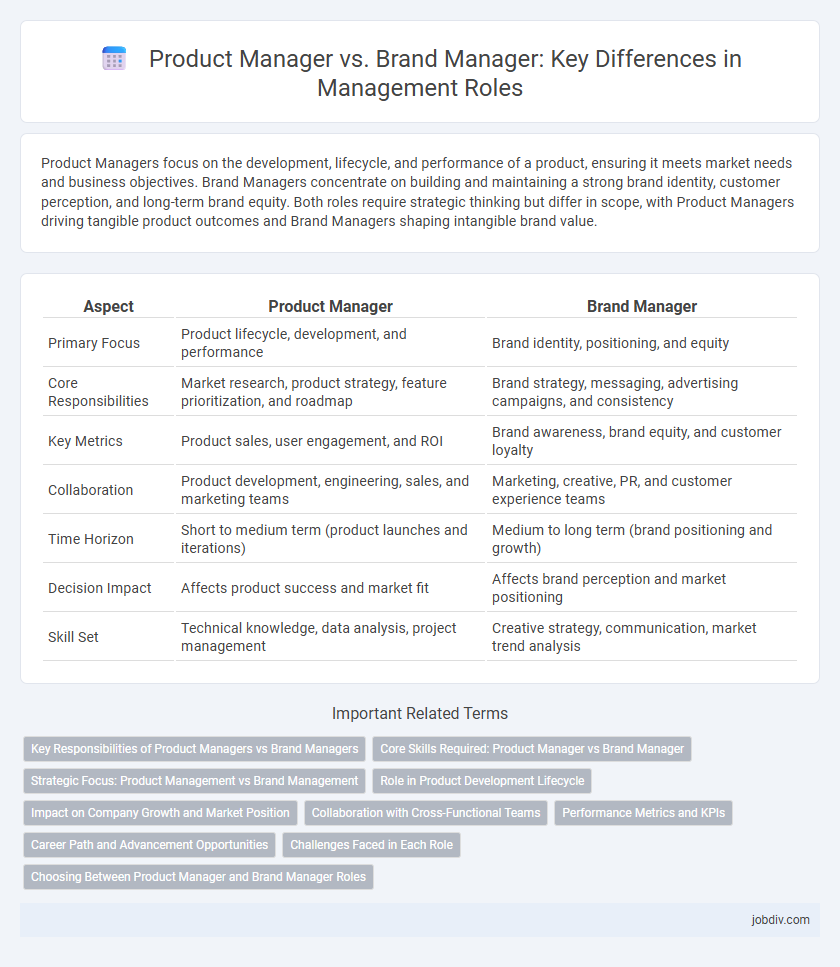Product Managers focus on the development, lifecycle, and performance of a product, ensuring it meets market needs and business objectives. Brand Managers concentrate on building and maintaining a strong brand identity, customer perception, and long-term brand equity. Both roles require strategic thinking but differ in scope, with Product Managers driving tangible product outcomes and Brand Managers shaping intangible brand value.
Table of Comparison
| Aspect | Product Manager | Brand Manager |
|---|---|---|
| Primary Focus | Product lifecycle, development, and performance | Brand identity, positioning, and equity |
| Core Responsibilities | Market research, product strategy, feature prioritization, and roadmap | Brand strategy, messaging, advertising campaigns, and consistency |
| Key Metrics | Product sales, user engagement, and ROI | Brand awareness, brand equity, and customer loyalty |
| Collaboration | Product development, engineering, sales, and marketing teams | Marketing, creative, PR, and customer experience teams |
| Time Horizon | Short to medium term (product launches and iterations) | Medium to long term (brand positioning and growth) |
| Decision Impact | Affects product success and market fit | Affects brand perception and market positioning |
| Skill Set | Technical knowledge, data analysis, project management | Creative strategy, communication, market trend analysis |
Key Responsibilities of Product Managers vs Brand Managers
Product managers primarily focus on product lifecycle management, including product development, market research, feature prioritization, and revenue optimization. Brand managers concentrate on brand strategy, market positioning, advertising campaigns, and customer perception to build brand equity. Both roles require collaboration with marketing, sales, and design teams but differ in their core objectives of product performance versus brand identity.
Core Skills Required: Product Manager vs Brand Manager
Product Managers require strong analytical skills, market research expertise, and proficiency in product lifecycle management to drive product development and strategy. Brand Managers need exceptional communication abilities, creativity in brand positioning, and skills in consumer behavior analysis to enhance brand equity and customer loyalty. Both roles demand leadership and cross-functional collaboration, but Product Managers emphasize technical and strategic competencies while Brand Managers focus on marketing and brand storytelling.
Strategic Focus: Product Management vs Brand Management
Product Managers concentrate on the development lifecycle, market fit, and feature prioritization to drive product success and customer satisfaction. Brand Managers focus on shaping brand identity, positioning, and messaging to build long-term customer loyalty and market perception. Strategic priorities diverge as Product Management drives innovation and usability, while Brand Management ensures consistent brand equity and emotional connection with the target audience.
Role in Product Development Lifecycle
A Product Manager drives the entire product development lifecycle, focusing on market research, feature prioritization, and cross-functional team coordination to ensure the product meets customer needs and business goals. In contrast, a Brand Manager oversees brand positioning, messaging, and marketing strategies to build brand equity and loyalty, primarily influencing the product's perception rather than its development. While Product Managers align product specifications with user experience and technical feasibility, Brand Managers shape the external narrative and customer engagement throughout the product's market presence.
Impact on Company Growth and Market Position
Product Managers drive company growth by identifying market needs, guiding product development, and ensuring competitive offerings that meet customer demands. Brand Managers enhance market position through consistent messaging, brand equity building, and customer loyalty strategies that differentiate the company from competitors. Both roles contribute to sustained revenue increase, but Product Managers often influence innovation and market expansion more directly.
Collaboration with Cross-Functional Teams
Product Managers collaborate closely with engineering, design, and marketing teams to ensure product development aligns with customer needs and business goals. Brand Managers work alongside creative, sales, and communications teams to maintain consistent brand messaging and drive brand equity. Both roles require strong interpersonal skills to facilitate seamless cross-functional collaboration and deliver integrated market solutions.
Performance Metrics and KPIs
Product Managers prioritize performance metrics such as user engagement, feature adoption rates, and revenue growth to directly influence product success and market fit. Brand Managers focus on KPIs like brand awareness, customer loyalty scores, and brand equity to strengthen consumer perception and long-term brand value. Both roles rely on data-driven insights, but Product Managers emphasize product-specific metrics while Brand Managers target brand-centric performance indicators.
Career Path and Advancement Opportunities
Product Managers typically advance by deepening expertise in product lifecycle management, often moving into roles like Senior Product Manager, Product Director, or VP of Product, with a strong focus on strategy and cross-functional leadership. Brand Managers progress through marketing-centric roles, advancing to Brand Director, Marketing VP, or Chief Marketing Officer, emphasizing brand positioning, consumer insights, and market growth. Career paths differ as Product Managers prioritize product innovation and user experience, while Brand Managers concentrate on brand equity and market communication.
Challenges Faced in Each Role
Product Managers face challenges in balancing technical feasibility, market demands, and cross-functional team coordination to deliver successful product launches on time. Brand Managers encounter difficulties in maintaining consistent brand identity across diverse markets while adapting to shifting consumer preferences and competitive pressures. Both roles require strategic decision-making under uncertainty but differ in their primary focus on product development versus brand perception.
Choosing Between Product Manager and Brand Manager Roles
Choosing between a Product Manager and a Brand Manager role hinges on whether you prefer driving product development and lifecycle management or shaping brand identity and market positioning. Product Managers focus on technical specifications, user experience, and cross-functional teams to deliver successful products, while Brand Managers concentrate on marketing strategy, brand equity, and customer perception to build strong brand loyalty. Understanding your strengths in data analysis, market trends, and stakeholder collaboration is crucial for selecting the optimal management path.
Product Manager vs Brand Manager Infographic

 jobdiv.com
jobdiv.com